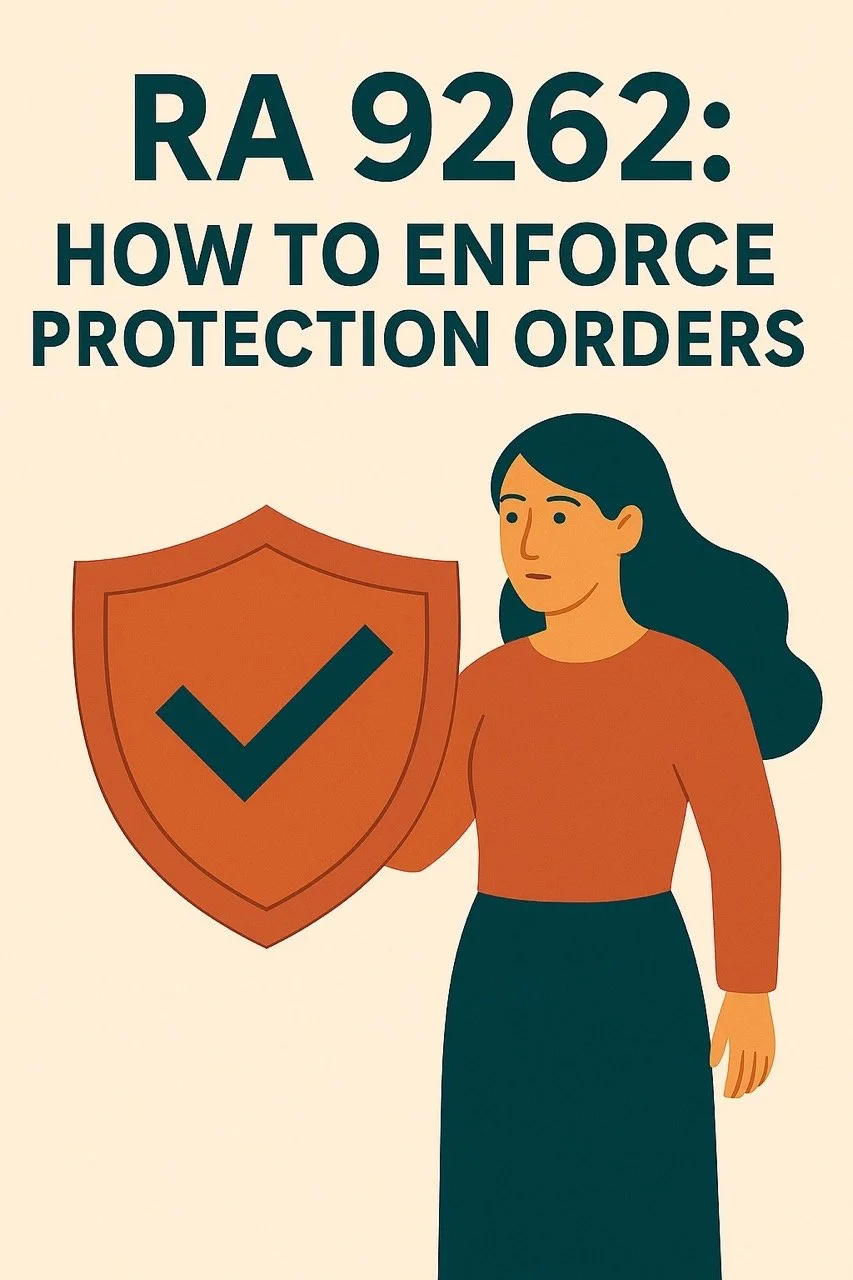RA 9262: How to Enforce Protection Orders
Under Republic Act No. 9262, or the Anti-Violence Against Women and Their Children Act of 2004, victims of abuse are granted legal protection through various types of protection orders. These orders are essential in preventing further acts of violence and ensuring the safety of women and their children. This article outlines the types of protection orders available under RA 9262, the penalties for violating them, and how they are enforced through indirect contempt proceedings, without prejudice to the filing of other criminal or civil cases.
Types of Protection Orders Under RA 9262
RA 9262 provides for three types of protection orders, each with its own purpose and scope:
1. Barangay Protection Order (BPO)
A BPO is issued by the Punong Barangay or a Barangay Kagawad in the former’s absence. It prohibits the respondent from committing further acts of physical violence or threats as defined in Sections 5(a) and 5(b) of the law. This order is effective for 15 days and is designed for immediate, community-based protection.
2. Temporary Protection Order (TPO)
A TPO is issued by the court, either ex parte or during a hearing, upon determination of the need for urgent protection. When issued ex parte, it takes effect upon service and remains valid for 30 days. The application for a TPO is automatically treated as an application for a Permanent Protection Order (PPO).
3. Permanent Protection Order (PPO)
A PPO is granted after a full hearing on the merits of the case or may be issued motu proprio by the court during the trial or after a judgment. It remains in force until revoked or modified by the court. If the respondent is convicted in a criminal case arising from the same facts, a PPO is issued as a matter of course.
Penalties for Violating Protection Orders
Violating any protection order under RA 9262 carries serious legal consequences:
Violation of a Barangay Protection Order is punishable by imprisonment of up to 30 days, without prejudice to any other criminal or civil case filed by the offended party.
Violation of a court-issued protection order (TPO or PPO) is punishable by a fine ranging from ₱5,000 to ₱50,000, imprisonment of up to six months, or both, at the court’s discretion.
Any violation of protection orders issued during trial or upon judgment (under Section 25 of RA 9262) is also considered contempt of court, which can be pursued separately under the Rules of Court.
Enforcement Through Indirect Contempt Proceedings
One of the primary legal remedies for enforcing protection orders is through indirect contempt proceedings under Rule 71 of the Rules of Court.
1. Initiation by the Court (Motu Proprio)
If the violation occurs in relation to an ongoing case, the court may initiate contempt proceedings on its own. It does so by issuing an order requiring the respondent to explain why they should not be held in contempt.
2. Initiation by a Party
If the offended party initiates the action, they must file a verified petition for indirect contempt. A mere motion is insufficient and procedurally defective. The verified petition must:
Be filed separately from the main case;
Include supporting facts and certified true copies of relevant documents; and
Comply with all requirements for initiatory pleadings, including a Certification Against Forum Shopping.
The purpose of these strict requirements is to ensure due process and avoid abusive litigation tactics. Courts generally do not consider procedural shortcuts as substantial compliance.
3. Sanctions for Indirect Contempt
If found guilty of indirect contempt, the respondent may face imprisonment, a fine, or both. In cases where the contempt involves refusing to do something ordered by the court, the court may order detention until the act is performed, though this is discretionary. However, the contempt power must be used carefully to avoid imposing excessive or unjust penalties.
Other Legal Remedies Available
Enforcement of protection orders through contempt proceedings does not preclude the filing of:
A criminal case under RA 9262 or other applicable laws; or
A civil action for damages, including claims for moral and exemplary damages.
Victims are free to pursue these remedies independently or concurrently, provided there is no double recovery for the same injury.
Final Thoughts
Enforcing a protection order under RA 9262 involves knowing the right steps—and the proper legal remedies. Whether through barangay intervention, court protection orders, or contempt proceedings, the law offers robust tools to ensure compliance and protect victims from further harm. Understanding these mechanisms is essential for both victims and legal practitioners seeking to uphold the intent of the law.
*This blog post is intended for informational and academic purposes only and does not constitute legal advice. Readers are encouraged to consult a qualified lawyer for advice specific to their individual circumstances.
Need legal help enforcing a protection order or responding to one under RA 9262?
Contact us and set an appointment today. Our team is ready to guide you through every step with clarity, compassion, and legal precision.
